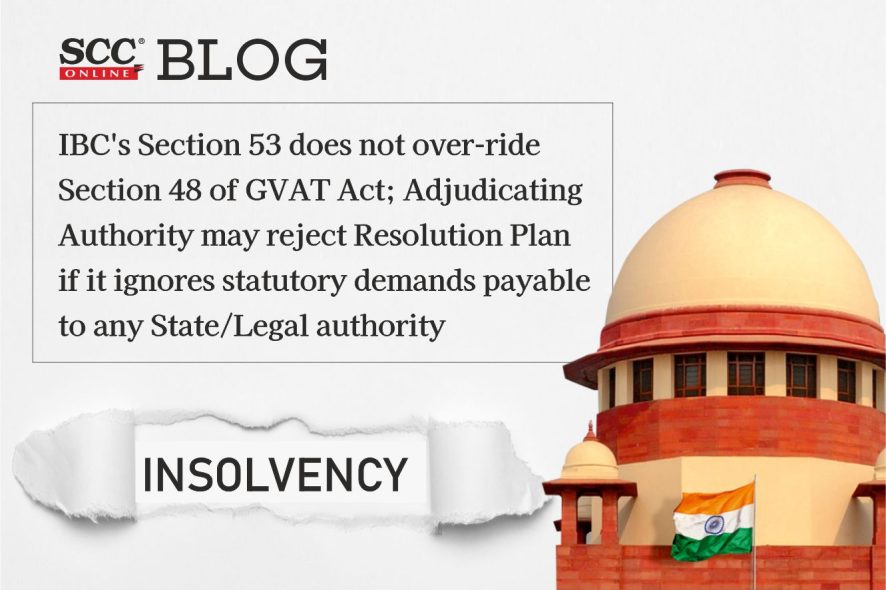Supreme Court: The bench of Indira Banerjee* and AS Bopanna, JJ has reversed the NCLAT order wherein it was held that the Government cannot claim first charge over the property of the Corporate Debtor, as Section 48 of the Gujarat Value Added Tax, 2003 (GVAT Act), which provides for first charge on the property of a dealer in respect of any amount payable by the dealer on account of tax, interest, penalty etc. under the said GVAT Act, cannot prevail over Section 53 of the Insolvency and Bankruptcy Code, 2016 (IBC).
Holding that NCLAT clearly erred in its observation that Section 53 of the IBC over-rides Section 48 of the GVAT Act, the Court observed that, Section 48 of the GVAT Act is not contrary to or inconsistent with Section 53 or any other provisions of the IBC. Under Section 53(1)(b)(ii), the debts owed to a secured creditor, which would include the State under the GVAT Act, are to rank equally with other specified debts including debts on account of workman’s dues for a period of 24 months preceding the liquidation commencement date.
Going into the scheme of both the Statutes, the Court said that Section 3(30) of the IBC defines secured creditor to mean a creditor in favour of whom security interest is credited. Such security interest could be created by operation of law. The definition of secured creditor in the IBC does not exclude any Government or Governmental Authority. Likewise, the State is a secured creditor under the GVAT Act.
On the validity of a resolution plan which does not meet the requirements of Section 30(2) of the IBC, the Court held that the same would be invalid and not binding on the Central Government, any State Government, any statutory or other authority, any financial creditor, or other creditor to whom a debt in respect of dues arising under any law for the time being in force is owed. Such a resolution plan would not bind the State when there are outstanding statutory dues of a Corporate Debtor.
Explaining the scope of Section 31 of the IBC, the Court said that if a Resolution Plan meets the requirements, the Adjudicating Authority is mandatorily required to approve the Resolution Plan under Section 31(1). On the other hand, Section 31(2), which enables the Adjudicating Authority to reject a Resolution Plan which does not conform to the requirements referred to in Section 31(1), uses the expression “may”. If the established facts and circumstances require discretion to be exercised in a particular way, discretion has to be exercised in that way. If a Resolution Plan is ex facie not in conformity with law and/or the provisions of IBC and/or the Rules and Regulations framed thereunder, the Resolution would have to be rejected.
It was, hence, held that if the Resolution Plan ignores the statutory demands payable to any State Government or a legal authority, altogether, the Adjudicating Authority is bound to reject the Resolution Plan. Consequently, the Court observed that the Committee of Creditors, which might include financial institutions and other financial creditors, cannot secure their own dues at the cost of statutory dues owed to any Government or Governmental Authority or for that matter, any other dues.
Hence, if a company is unable to pay its debts, which should include its statutory dues to the Government and/or other authorities and there is no plan which contemplates dissipation of those debts in a phased manner, uniform proportional reduction, the company would necessarily have to be liquidated and its assets sold and distributed in the manner stipulated in Section 53 of the IBC.
[State Tax Officer v. Rainbow Papers Ltd, 2022 SCC OnLine SC 1162, decided on 06.09.2022]







